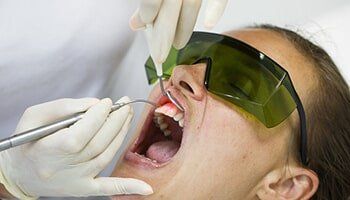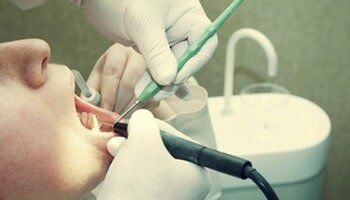Laser Periodontal Therapy in Hemet, California
How do I know if I need to have laser therapy?
While lasers have many uses in today's dental office they are not used for every procedure. Your dentist or hygienist will decide if laser therapy is appropriate for your particular procedure.
How can I be sure my dentist is competent to use a laser?
Owning a laser demonstrates that your dentist has made a financial and educational investment toward providing the very best care possible. Only a small percentage of dental offices have made this financial and personal investment for the well-being and comfort of their patients. If you have any questions regarding your dentist experience and or training please feel free to ask.
Laser use in Periodontal Disease(Gum Disease)

Your dentist has diagnosed you as having periodontal disease or gum disease. This is an infection of bone and supporting structures of your teeth. Before 30 years of age. decay is the major reason for tooth loss and after 30 years of age. gum disease is the major reason for tooth loss. It is estimated that over 80 percent of the adult population has gum disease to one degree or another.
Periodontal bacteria can cause an inflammatory reaction which leads to destruction of the fibers that connect teeth to bone and can create a space that dentists and hygienists call a periodontal pocket. While everyone has some amount of pocketing the normal depths are 1-3 mm. You can keep 3 mm or fewer pockets clean by yourself with routine brushing, flossing and rinsing. However, in your situation you have pockets that are deeper than 3 mm and it is impossible for you to clean and maintain them. As a result you have debris and bacteria living at the bottom of these pockets which has led to chronic gum infection. you may have noticed a bad taste or odor in your mouth at times from these infections. As we age we become more susceptible to periodontal bacteria and lack of proper hygiene or cleaning is another reason for periodontal disease. Without treatment your teeth will lose enough support to become loose and painful and will eventually be lost.
Periodontal bacteria can cause an inflammatory reaction which leads to destruction of the fibers that connect teeth to bone and can create a space that dentists and hygienists call a periodontal pocket. While everyone has some amount of pocketing the normal depths are 1-3 mm. You can keep 3 mm or fewer pockets clean by yourself with routine brushing, flossing and rinsing. However, in your situation you have pockets that are deeper than 3 mm and it is impossible for you to clean and maintain them. As a result you have debris and bacteria living at the bottom of these pockets which has led to chronic gum infection. you may have noticed a bad taste or odor in your mouth at times from these infections. As we age we become more susceptible to periodontal bacteria and lack of proper hygiene or cleaning is another reason for periodontal disease. Without treatment your teeth will lose enough support to become loose and painful and will eventually be lost.
How are lasers used to treat gum disease?

Your dentist has recommended a conservative non-surgical treatment for your periodontal disease. With proper home care and your participation. This procedure can often alleviate the problem. Your dentist or hygienist will go around each involved tooth to remove any debris and calcified deposits that are adhering to your teeth in a process called scaling and root planing A good analogy to this part of the cleaning is like removing barnacles off of a pier. Scaling and root planing will remove the mechanical irritants to your gums and supporting bone and also removes a major reservoir of periodontal bacteria. After removing the tartar and calculus a laser is used to selectively remove diseased or infected tissues lining the pockets around your teeth. At the same time the laser will kill the bacteria that cause your gum disease and promote healing of your gums around your teeth. Some lasers can help increase circulation and collagen formation at the bottom of your periodontal pockets and help revive or rejuvenate your attachment This specialized treatment is usually performed multiple times over a period of a few weeks.
What about pain?
One of the biggest advantages of laser therapy is the fact that many times procedures can be performed with much less discomfort and postoperative pain than with conventional methods. This is due to the lasers ability to seal off nerve endings and blood vessels and to be tissue specific during treatment. Hard tissue lasers have been reported to have an analgesia type effect making the use of anesthetic unnecessary in many cases. Since hard tissue lasers are used in a non contact manner there is also less heat and vibration produced versus a traditional hand-piece.
What about damage to my eyes?
Your dentist or hygienist will have you wear special safety eye wear during the procedure. These specially designed glasses also protect your eyes from other materials that may be used during your therapy.





